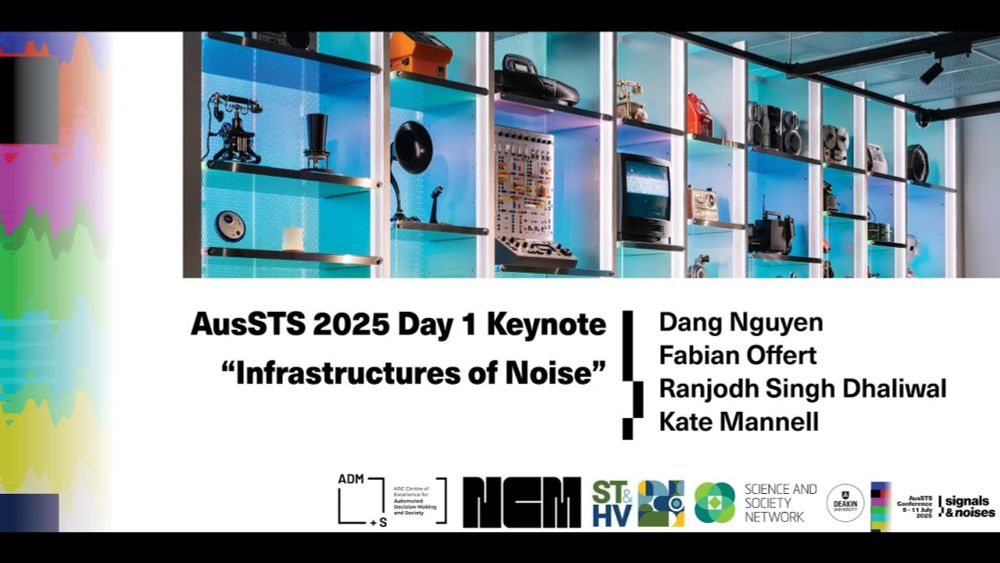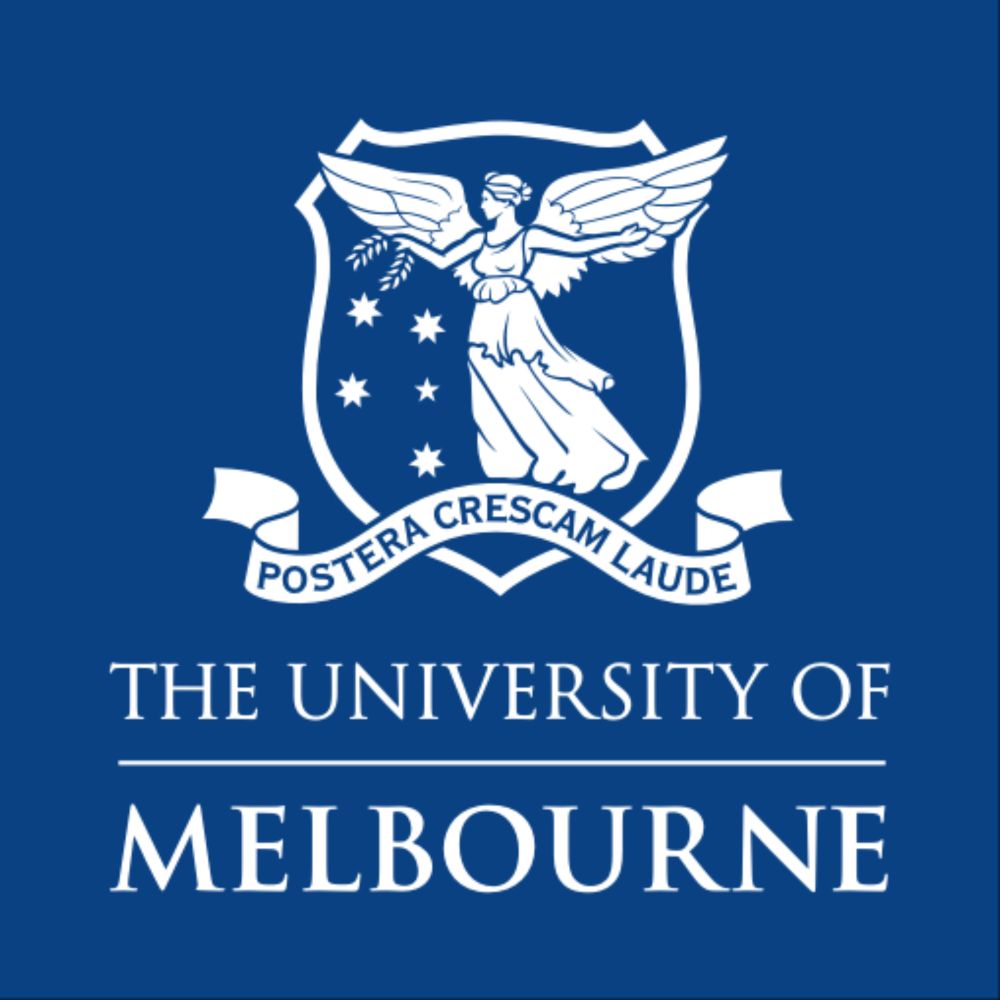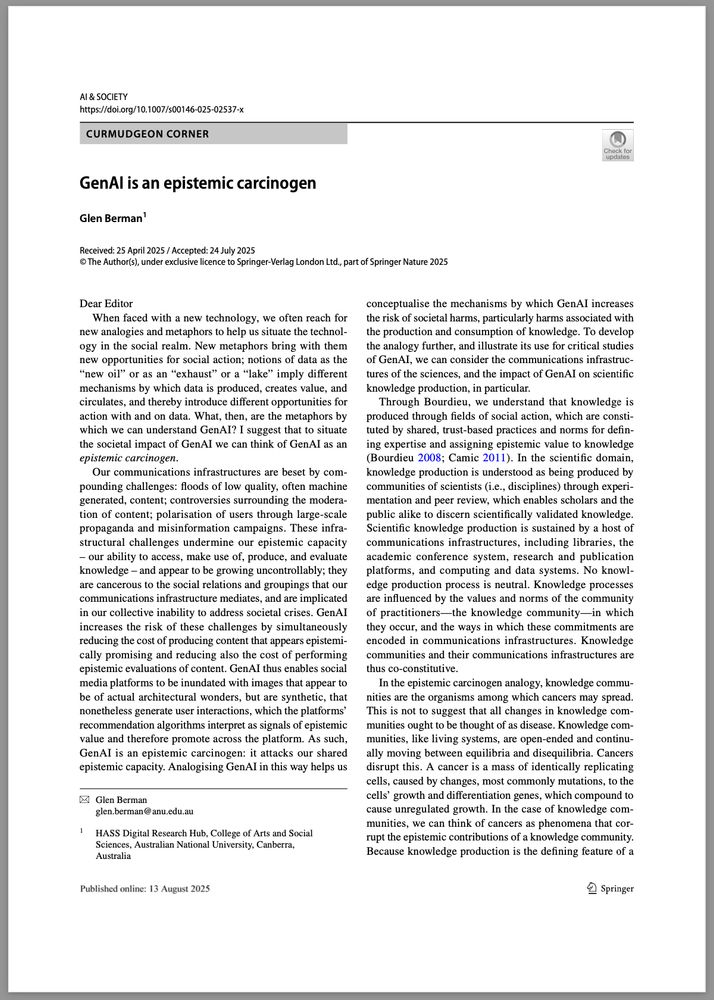Glen Berman
@glenberman.bsky.social
870 followers
310 following
74 posts
PhD candidate and researcher @ Australian National University. Studying the practices of Artificial Intelligence research and development. Living and working in Melbourne, on Wurundjeri Country. #ResponsibleAI #STS
Posts
Media
Videos
Starter Packs
Pinned
Glen Berman
@glenberman.bsky.social
· Aug 19
Glen Berman
@glenberman.bsky.social
· Aug 19
Glen Berman
@glenberman.bsky.social
· Aug 14
Glen Berman
@glenberman.bsky.social
· Aug 13
Glen Berman
@glenberman.bsky.social
· Jul 16
Glen Berman
@glenberman.bsky.social
· Jul 16
Glen Berman
@glenberman.bsky.social
· Jul 3

AusSTS 2025 Day 1 Keynote "Infrastructures of Noise"
Join the opening keynote of the 2025 AusSTS "Signals and Noises" conference, live from the National Communication Museum. We are thrilled to have Dang Nguyen (RMIT), Fabian Offert (UCSB), Ranjodh Dhal...
www.youtube.com
Glen Berman
@glenberman.bsky.social
· Jun 26
Glen Berman
@glenberman.bsky.social
· Jun 26
Glen Berman
@glenberman.bsky.social
· Jun 26

GenAI and advocacy organisations: developing reactive and proactive responses
In this post I share some reflections on how advocacy organisations can respond to GenAI. Writing these reflections has been an exercise in bridging two halves of my career to date.
shorturl.at
Glen Berman
@glenberman.bsky.social
· Jun 13

PhD Opportunity in Wider Societal Value of Research and Consequences of its Assessment: A multi-country and multi-method study (MultiSocVal) : Find an Expert : The University of Melbourne
<p> The overarching project is funded by a German Volkswagen Foundation Grant. It brings together international collaborators from four countries – University of Melbourne, Humboldt University, Stellenbosch University, SWPS University, and from a range of disciplines including public policy, sociology, data science, political science, applied linguistics, philosophy and science and technology studies. </p> <p> The PhD candidate will be supported by an overarching research team, including academics, postdocs, research associates and research assistants, spread across the four countries. </p> <p> The overall goals of the group are described below, although there is considerable scope for the PhD candidatee to focus their thesis on an aspect of this work that interests them. </p> <p> Many governments are showing a political commitment to research impact in their respective environments by investing in research evaluation initiatives at different scales. Often the initiatives are characterised by pragmatism, with little attention to underlying value judgements. This creates an urgent need for comparative work with a strong theoretical and empirical basis to study the effects of national evaluation initiatives around impact and societal value. The overall project will address this need through a multi-country and multi-method study of research evaluation initiatives in Germany, Australia, the United Kingdom, Poland and South Africa. Bringing together an international and interdisciplinary team, the project seeks to: </p> <p> (1) produce a comprehensive cross-national and cross-disciplinary overview of research systems with regard to scientific and societal value; </p> <p> (2) investigate what is considered worthwhile research within and between countries; </p> <p> (3) compare the effects of different research evaluation initiatives around impact on research practice in different countries; </p> <p> (4) develop an integrated conceptual framework of scientific and societal value to improve science policy and science practice; and </p> <p> (5) advance stakeholders’ understanding of the effects of research impact assessment for better future evaluation. </p> <p> <strong>About you</strong> </p> <p> We are looking for a candidate with a strong academic background in a relevant discipline such as public policy, sociology, political science, science and technology studies, or a related field. The candidate will be intellectually curious and motivated by critical questions about the role of research in society. Ideally, the candidate will bring an interest in the changing landscape of research governance, including how ideas of value, worth, and impact are shaped and operationalised across national science systems. </p> <p> We welcome applicants with experience in qualitative, quantitative, or mixed-methods research. An enthusiasm for learning new methods – including bibliometric or computational text analysis, survey design, or innovative qualitative analysis – will be an advantage. The candidate will thrive in interdisciplinary and collaborative environments and be keen to contribute to an international research team spanning multiple countries and disciplinary traditions. Strong written and verbal communication skills, along with the ability to work independently and manage a sustained research project, are essential. </p> <p> This project offers considerable scope for the PhD candidate to shape their own research focus within the broader program, and would suit someone interested in contributing to both theoretical and practical understandings of how research is evaluated and governed in contemporary societies. </p> <p> <strong>Eligibility</strong> </p> <p> Domestic and International applicants may apply. You must meet the entry requirements for the <a href="https://handbook.unimelb.edu.au/courses/dr-philart">Doctor of Philosophy – Arts at the University of Melbourne (link attached)</a> including English language requirements and demonstrate excellent capacity and potential for research. </p> <p> As the successful candidate, You will demonstrae: </p> <ul> <li>An academic background in the field of sociology (of culture/science or related area), STS, library and information science, or public policy/research governance </li> <li>A relevant undergraduate and/or postgraduate degree with an average that equivalent to a H1 (80%) at the University of Melbourne, including H1 results in the Honours or Master’s thesis component; and </li> <li>Experience with qualitative analysis or quantitative analysis in the above fields </li> <li>The ability to write research reports or other publications to a publishable standard (even if not published to date) </li> <li>capability to manage projects effectively, meet deadlines and achieve outcomes within a specified timeframes. </li> </ul> <p> <strong>How to submit an expression of interest</strong> </p> <p> Please submit your expression of interest (EOI) via the ‘Submit Expression of Interest’ button by 15 July 2025. </p> <p> Your EOI must include: </p> <ul> <li>A short description of how the project aligns with your interest and experience, an overview of how your might approach the project goals, and an outline of three relevant references from the literature with a description of how they relate to the project </li> <li>A CV that highlights your relevant academic achievements and any relevant professional experience including the names of two academic referees. </li> <li>Higher education academic transcripts that give detailed information of the individual marks received in your university-level qualifications to date </li> <li>An example of your written academic work (e.g. Honours or masters thesis or peer-reviewed journal article) </li> </ul> <p> For more information about our PhD program and application process, please visit <a href="https://arts.unimelb.edu.au/study/graduate-research"><strong>this website</strong></a>. </p>
shorturl.at
Glen Berman
@glenberman.bsky.social
· May 23
Glen Berman
@glenberman.bsky.social
· May 23
Glen Berman
@glenberman.bsky.social
· May 23
Glen Berman
@glenberman.bsky.social
· May 23
Glen Berman
@glenberman.bsky.social
· May 23
Glen Berman
@glenberman.bsky.social
· May 23
Glen Berman
@glenberman.bsky.social
· May 23
Glen Berman
@glenberman.bsky.social
· May 23
Glen Berman
@glenberman.bsky.social
· May 23
Glen Berman
@glenberman.bsky.social
· May 23




